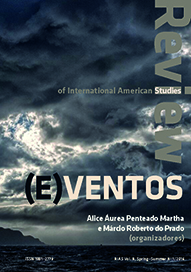Visőes De Além-Mar: A compreensăo das identidades culturais latino-american e brasileira pela literatura e pelo teatro
Overseas Visions: Understanding Latin American and Brazilian Cultural Identities Through Literature and Theater
Author(s): Elizabete Sanches RochaSubject(s): Anthropology, Social Sciences, Theatre, Dance, Performing Arts, Language and Literature Studies, Fine Arts / Performing Arts, Studies of Literature, Comparative Study of Literature, Other Language Literature, Cultural Anthropology / Ethnology, Culture and social structure
Published by: Wydawnictwo Uniwersytetu Śląskiego
Keywords: Sea; cultural identity; the Other; Latin American
Summary/Abstract: In order to fully understand the complexity of the paths of Latin American (post-Columbian) identity formation—a process born out of the first violent encounter with the European Other—it is indispensable to resort to mythologized narratives of origin, most of which are linked to the mysterious, enchanting sea. Such myths have always been the source of inspiration: they would feed the imaginations of those who, well aware of the hazards, would still choose to face the challenge of the sea in order to conquer new lands in search of new treasures. Literature evokes an important reflection about the Latin American identity. Among others, it reveals the importance—and persistence—of the discourse of the ‘subaltern’. Fostered throughout centuries, the ‘subaltern’s’ perseverance manifests itself even today in the unequal relations between the countries of the North and those of the South. Calabar, a drama by Chico Buarque and Ruy Guerra.s, is an example of an aesthetic enterprise to photograph Brazil through the lense of the new conquests: the dictatorship of the Civil-Military Regime of 1964 in Brazil and of the cultural and political dominance of the US over Latin America. The text of the play reveals historical entanglements dating back to the colonial origins of the dominant paradigm of exploitation and thereto related political and cultural scripts. This article attempts to examine the contribution of literary fiction to the process of reflection over the confrontation between the Self and the Other with the ocean as the in-between-space of cultural encounters and dis-counters.
Journal: Review of International American Studies
- Issue Year: 9/2016
- Issue No: 1
- Page Range: 19-41
- Page Count: 23
- Language: Portuguese

